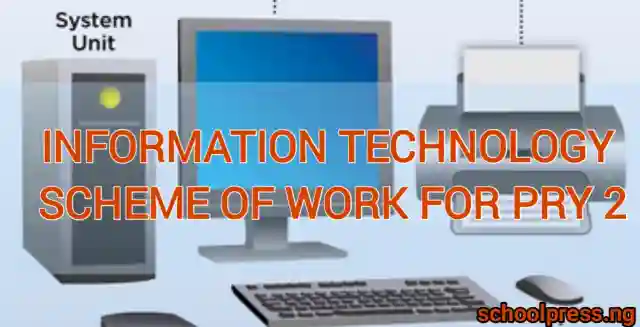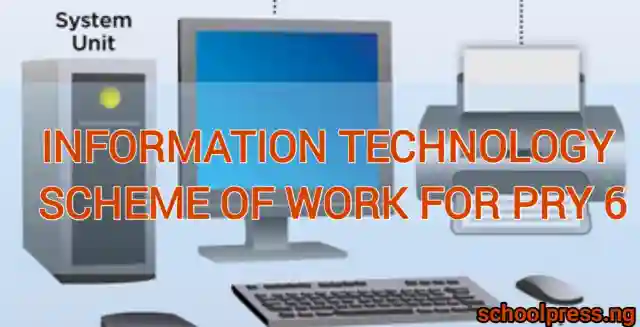Christian Religious Studies is a vital subject to enable young pupils to learn the Christian faith. The Christian Religious Studies scheme of work for Primary 2 is to ensure pupils between the age of 5 – 6 years acquire some facts about Christian religious studies.
Therefore, the following are the aspects of the Christian faith to be covered in the scheme of work, prayer, the life of Jesus, and the kingdom of God. The purpose of the school work is to make sure pupils prosper at identifying Jesus as a man of prayer, the significance of prayer, and the types of prayer.
During the first term of the scheme of work, pupils will be introduced to prayer and its significance in the life of a Christian. While praying, pupils will establish how to pray, that is, what to pray for and why Christians pray.
Besides, pupils will be introduced to the various forms of prayer and Christian’s posture during prayer.
The second term will cover the teachings of Jesus Christ. Pupils will establish the various events that unfolded before the ministry of Jesus Christ, the forces of nature, as well as his power against sin and death.
The third term of the scheme of work will address varying aspects of the plan of salvation. For instance, pupils will be taught about the creation of Adam and Eve and the punishment of disobedience. Additionally, pupils will learn about God’s promise of salvation and the way of life of Abraham. Moreover, the term covers the birth of Moses and the history of events that led to the release of the children of Israel from Egypt.
To make pupils know more about the Christian faith and understand the need for prayer, obedience, and salvation. Hence, the outcomes of the scheme of work are: that at the end of the lesson, pupils should be able to list the areas that show Jesus was a praying man, list five reasons why Christians pray, and explain the significance of obedience in the life of a Christian.
Objectives of Christian Religious Studies scheme of work for Primary 2 Scheme of Work for Primary 1
First Term Objectives
Week 1-2: Identify Jesus as a man of prayer, State the reasons why Jesus prayed, Mention instances in their lives when they ought to pray, Explain the importance of prayers in the life of a Christian
Week 3: Describe how Jesus taught us to pray, Say the Lord’s prayer, Discuss the reasons Jesus asked us to pray and Explain the importance
Week 4: List types of prayer Enumerate some of the things to pray for, Explain why Christians pray
Week 5: Mention the different forms of prayer, Identify the people in the Bible who prayed the different forms of prayer and Explain the reasons for the different forms of prayer
Week 6: List different positions Christians could take while praying, Name people in the Bible who prayed in different positions and State possible reasons why people pray in these different positions
Week 8-10: Identify Bible evidence of the power of prayer, Identify people in the Bible who prayed, State what they asked for in their prayers, Explain how God answered their prayers and Discuss the importance of the power of prayer
Second Term Objectives
Week 1: Narrate the message of the angel to Joseph after the departure of the wise men, Name the people who were at the presentation of Jesus in the temple, State what Simeon said at the temple at the presentation of Jesus and State the messages in the teachings of Jesus at the Temple
Week 2-3: Mention the events that prepared Jesus for His ministry Explain the baptism of Jesus, Describe the temptation of Jesus, Name the disciples of Jesus and Discuss the significance of Jesus calling the 12 to be His disciples
Week 4-5: Narrate the events that show the power of Jesus, Explain why Jesus helped the people in the events and Discuss the importance of obedience as illustrated in the great catch of fishes (Peter’s obedience), turning of water into wine… etc
Week 6: Discuss the more powers of Jesus e.g power over evil, diseases and death, Narrate the stories of the paralyzed man whom Jesus healed, Name people in the Bible whom Jesus raised from the death and State the significance of Jesus healing raising from the dead, power over sin and death
Week 8-9: Narrate the story of Mary Magdalene, Explain the lessons learnt from the story, Identify other people whose sins were forgiven by Jesus and Relate the power of Jesus over sin to the Salvation of Christians (5) State the importance of forgiveness of sins in our Christian lives
Week 10: Narrate the stories of Parables to illustrate the kingdom of God, Explain the lessons in the parables and State the importance of these lessons in preparing us for the kingdom
Third Term Objectives
Week 1: list the various things Christians should do in preparation for the kingdom of God other creations, Explain the disobedience of Adam and Eve, Discuss the punishment God gave Adam and Eve, Describe the punishment given to the serpent for leading Adam and Eve to sin against God, State God’s promise of salvation
Week 2-3: Recite Ps.l03:l-2, Sing a song of praise, Mention some names of people in the Bible who sang praises to God and Give reasons for praising God
Week 4-5: Narrate the story of Abraham Explain how Abraham demonstrated his faith and obedience to God, Enumerate the things promised to Abraham and Identify the blessings of God to Abraham as a result of his obedience and Discuss the rewards of obedience
Week 6: Narrate the story of the birth of Jacob Describe the relationship between Jacob and his brother Esau, Discuss Jacob’s dream at Bethel and State the blessings promised to Jacob
Week 8: Discuss the relationship between Joseph, his brothers and parents, Discuss Joseph’s dreams and relate Joseph’s faithfulness and the rewards to the promise of salvation
Week 9-10: Tell the story of the birth of Moses, Show how Moses identified himself with his people, discuss the significance of the burning bush, Explain the events that led to the release of Israelites from Egypt Describe the events of the crossing of the Red Sea
Read More: 2024 JAMB UTME Form: Know The Important Information For The Exam Registration
Learning Outcomes of Christian Religious Studies scheme of work for Primary 2 Scheme of Work for Primary 1
First-Term Learning Outcomes
Week 1-2: State three instances when Jesus prayed, Say why Jesus prayed always, Mention two conditions which would compel them to pray to God and State the importance of prayers in the lives of Christians
Week 3: Explain what Jesus prayed for, Say the Lord’s prayer, Explain why Jesus encourages us to pray and Discuss the values of constancy in prayer
Week 4: Mention two different types of prayer, Give an example of each type of prayer, Mention three people and things they pray for and State two reasons why Christians pray
Week 5: List two different forms of prayer Identify two people in the Bible who prayed in these forms, State two reasons people pray the different forms of prayer
Week 6: List two different types of prayer positions and Give an example of two people who prayed in different positions and Explain two reasons for praying in different positions
Week 8-10: Describe instances in the Bible portraying the power of prayer, State the prayer request of Hannah Elijah and Jesus and Name other people in the Bible who made a prayer request, Explain how God answered the prayers of these people and State two importance of prayer
Second Term Objectives
Week 1: Narrate the message of the Angel after the departure of the wise men, Mention two people who were at the presentation of Jesus in the temple, Explain the message and lessons for Christians at the presentation of Jesus in the Temple and State what Simeon said in the Temple.
Week 2-3: Mention three events that prepared Jesus for His ministry, Describe the baptism of Jesus and Mention two disciples of Jesus
Week 4-5: Pupils name two occasions when Jesus showed His power over natural forces, Say why Peter caught so much fish, Explain the importance of obeying God in the life of a Christian
Week 6: Describe two events that show the powers of Jesus, Name Two persons in the Bible that Jesus healed raised from death and State two significant of the healing powers of Jesus
Week 8-9: Tell the story of Mary Magdalene Name two people in the Bible whose sins were forgiven by Jesus and Discuss the importance of forgiveness to Christians
Week 10: Explain the meaning of the parable of the sower, Say why the foolish virgins could not enjoy the wedding feast, State the lessons in the parables and State two importance of these lessons
Third Term Objectives
Week 1: Mention six things Jesus Commanded us to do in order to enter into the kingdom of God
Week 2-3: Explain how God created Adam and Eve and Give two differences between the creation of man and other creatures State the sin of Adam and Eve, Describe the punishments of Adam and Eve, The Serpents and Narrate God’s promise of salvation
Week 4-5: Explain how Abraham demonstrated his faith and obedience to God, Mention two things that God promised Abraham, Enumerate the blessings of God on Abraham and moderate rewards Christians will receive by obeying God
Week 6: Tell the story of the birth of Jacob, State what happened between Jacob and his brother, Narrate Jacobs’s dream at Bethel and Describe the blessings promised to Jacob
Week 8: Explain the relationship between Joseph and his brothers, Narrate Joseph’s dreams and Explain the rewards of Joseph’s faithfulness
Week 8-10: Narrate the story of the birth of Moses Give instances when Moses identified himself with his people in Egypt and Explain the importance of the burning bush, Describe the events that led to the release of the Israelites from Egypt and Describe what happened at the red sea
Read More On Primary 2 Scheme of Work
Basic Science Scheme of Work for Primary 2
Basic Technology Scheme of Work for Primary 2
Physical Health Education Scheme of Work for Primary 2
Information Technology Scheme of Work for Primary 2
Cultural And Creative Art Scheme of Work for Primary 2
History Scheme of Work for Primary 2
Mathematics Scheme of Work for Primary 2
Social Studies Scheme of Work For Primary 2
Civic Education Scheme of Work for Primary 2
Islamic Religious Studies Scheme of Work for Primary 2
First Term Christian Religious Studies scheme of work for Primary 2 Scheme of Work for Primary 1
| WEEK | TOPIC | CONTENT |
| 1-2 | Jesus the man of prayer | (1) Evidence portraying Jesus as a man of prayer Before raising Lazarus from the death Jn.6:14 Before feeding the five thousand Jn.6:1-14 At the last supper Mk.14:12-25 Before His trial Luk.6:12; Matt.26:39; 42-44 (2) Reasons why Jesus prayed Mk.1:35; Matt.14:23 (3) The significance of prayer in Jesus life (prayer prepares Jesus for tasks ahead of Him Matt.4:1-11; Matt.26:36-46; Lk.8:26-37 |
| 3. | Addition of items of 2-digit whole numbers with sum not greater than 40. | (1) How to pray/attitude to prayer Lk.11:1-28; Lk.18:9-14 Pray without ceasing Pray to God in Secret Pray for something specific Pray without getting discouraged Pray in faith without doubting (2) The model prayer matt.6:5-14 (3) Jesus encourage us to pray Matt.26:41; Lk.18:1-8 (4) Importance of prayer Lk.18:1-8 |
| 4. | Types of Prayer | 1) List types of prayer (2) Enumerate some of the things to pray for (3) Explain why Christians pray |
| 5. | Forms of prayer | (1) Forms of prayer verbalizing Jer.33:3 Meditation Gen.18:20-33, matt.6.6 Adoration: Phil.2:10; 1Chro.29:11-14 Groaning Rom.8:26, Ek.2:24 (2) People in the Bible that prayed different types of prayers (e.g Abraham, Jabez…etc) (3) Reasons for different types of prayers |
| 6. | Prayer Positions | Different positions Christians take while praying Standing Mk.11:25 Kneeling Dan.6:10 |
| 7. | Mid Term Test | |
| 8-10 | The Power of Prayer | (1) Evidences of the power of prayer The release of Paul and Silas Act.16:25-33 Answer to Hannah’s prayer 1Sam.1:19-20 Answer to Elijah’s prayer for fire to consume his sacrifice 1Kg.30:39 Answer to raise Lazarus Jn.11:41-44 (2) People in the Bible that prayed and what they prayed for (3) How God answered prayers in the Bible (4) Importance of the power of prayer e.g. It draws people closer to God |
| 11. | Revision | |
| 12 & 13 | Examination |
Second Term Christian Religious Studies scheme of work for Primary 2 Scheme of Work for Primary 1
| WEEK | TOPIC | CONTENT | |
| 1 | The Early life of Jesus | (1) The message of the Angel to Joseph (2) The flight to and return from Egypt Matt.2:13-23 (3) Those present at the presentation of Jesus in the Temple Simeon, Ana, Joseph Mary etc. Lk.2;21-40 (4) What Simeon said the Temple Lk.2:34-35 | |
| 2-3 | Jesus Preparation of His Ministry | (1) Events that prepared Jesus for His Ministry Baptism of Jesus Matt.3:13-17, Lk.3:21-24 The temptation of Jesus Matt.4:1-11 Stone to bread Jump down from Pinnacle of the temple Bow down and worship Satan (2) The calling of the disciples (Peter, John, James etc. Luk.6:12-16 | |
| 4-5 | The Power of Jesus | (1) Events that show the power of Jesus Calming the sea Mak.4:35- 41 Feeding of five thousand people Jn.6:5-14 The great catch of fish Lk.5:1-11 Jesu ned water into wine Jn.2:1-11 (2) Why Jesus helped the people in the four events (3) Importance of obedience as illustrated in the events | |
| 6 | The Power of Jesus (contd) | (1) Power over evil diseases and death People whom Jesus cleansed from evil Mk.5:1-20 People whom Jesus healed Peter’s mother-in-law Matt.8:14-17 The paralyzed man Lk.5:17-26 People whom Jesus raised from Death; Jairus daughter Lk.8:40-42, 49-56 The widow’s son Lk.7:11-17 and Lazarus Jn.11:1-44 (2) Significance of Jesus healing and raising the death power over sin and death | |
| 7. | Revision and Continuous Assessment | ||
| 8-9 | The power of Jesus (contd) | (1) Power to forgive sin Mk.2:1-12 Story of Mary Magdalene The people who crucified Jesus The thief on the cross etc. (2) lessons learnt from the stories (3) Other people whose sins were forgiven The story of the prodigal son and the merciful father Lk.15:11-32 The story of Zacchaeus and Jesus Changed Zacchaeus Lk.19:1-10 (4) The importance of forgiveness | |
| 10. | Jesus Teaching on the Kingdom of God | Stories and Parables illustrating the kingdom Parable of The sower Lk.8:4-15; Lk.16:19-31 (explain the various kinds of seeds and where they fell that we must be serious with our lives Ten virgins etc. (2) Lessons in the parables (3) Importance of the lessons in preparing us for the kingdom of God | |
| 11. | Revision | ||
| 12. | Examination | ||
Third Term Christian Religious Studies scheme of work for Primary 2 Scheme of Work for Primary 1
| WEEK | TOPIC | CONTENT | |
| 1 | Jesus Teaching on the kingdom of God (contd) | (1) Preparation for the kingdom Repentance Mk.1:14-15 Holiness Lev.19:2; Matt.5:48; Heb.12:4 Self-denial Matt.16:24-26; Lk.9:23 Detachment from worldly things Matt.19:16-21 Humility Matt.15:21-28 Generosity Lk.16:19-31 | |
| 2-3 | (1) Life of Joseph Joseph’s relationship with his brothers and parents Joseph’s dream Gen.37:1-11 Joseph’s faithfulness in Potiphar’s house and prison Gen.39:1-23 | (1) The story of Adam and Eve Gen.2:16-17; Gen.3:1 9 (2) Punishment of disobedience Gen.3:14-19 (3) First promise of salvation Gen.3:15 | |
| 4-5 | Plan of Salvation | (1) Call of Abraham Gen.12:1-4 Abraham’s call and obedience leave your country and your kinsmen to the land I will show you. Abraham obeyed God’s promise to Abraham (I will make your descendants like the sand in the seashores and will make you great Gen.17:1-8; 15-27. Abraham’s demonstration of his faith and obedience to God Gen.22:1-19 Reward for obedience (Isaac was born) | |
| 6 | Plan of Salvation (contd) | (1) Life of Esau and Jacob The birth of Esau and Jacob Gen.25:21-28 Jacob cheats his brother and father Gen.27:1-38 Jacobs dream at Bethel Gen.28:1-22 Blessings promised to Jacob | |
| 7. | Revision and Continuous Assessment | ||
| 8 | Plan of Salvation (Contd) | (1) Life of Joseph Joseph’s relationship with his brothers and parents Joseph’s Dream Gen.37:1-11 Joseph’s faithfulness in Potiphar’s house and prison Gen.39:1-23 | |
| 9-10. | Plan of salvation (contd) | (1) Life of Moses The birth of Moses Ex.2:1-10 Moses identified himself with his people Ex.2:11-12 Moses and the burning bush Ex.3:1-2 Moses asked for the release of his people Ex.24:21, 23 The crossing of the Red Sea | |
| 11. | Revision | ||
| 12-13 | Examination | ||
Teacher’s and Pupils Activities
First Term Teacher’s and Pupil’s Activities
Week 1-2: The teacher should Use passages from the Bible to explain the instances when and why Jesus prayed, Guide the class to discuss the: Significance of prayer in the life of Jesus and the Importance of prayers in their lives as Christians. Instances when they should pray When sick, In times of need, When making a journey, For success and Teaches pupils the song about the importance of prayers e.g prayer is the key
The Pupils should Listen to Bible Readings Ask and answer questions, Participate in class discussions, Sing songs
Week 3: The teacher should How to pray/attitude to prayer Lk.11:1-28; Lk.18:9-14, Pray without ceasing, Pray to God in Secret, Pray for something specific, Pray without getting discouraged, Pray in faith without doubting, The model prayer matt.6:5-14, Jesus encourages us to pray Matt.26:41; Lk.18:1-8
The Pupils should Discuss Jesus’ teaching on prayer, Teach pupils the Lord’s prayer, Guide the pupils to explain the message in the Lord’s prayer, Guide a discussion on How Jesus encourages us to pray, the Importance of prayer and guide pupils to dramatize the story of the wicked judge and the widow Lk.18:2-8
Week 4: The teacher should Use Bible passages to, Guide the class in listing types of prayer, Identify specific people and things to pray for, and Explain to pupils why they should pray
The Pupils should Mention types of prayers, Ask and answer questions, Read short prayers from their prayer Books, Participate in class discussions
Week 5: The teacher should Use Bible passages to help pupils – Mention the forms of prayer, Identify people who prayed the various forms of prayer and their reasons, Explain the importance of different forms of
The Pupils should Listen to explanations on the different forms of prayer, Ask and answer questions, Participate in class discussion
Week 6: The teacher should Guide the class in listing different prayer positions, Use Bible passages to help pupils identify people who took each position while praying, guide pupils to Demonstrate different prayer positions and State the reasons behind the positions people take while praying
The Pupils should Participate in discussions on different positions during prayers and Demonstrate the different prayer positions
Week 8-10: The teacher should Lead the class to identify evidence of the power of prayer, Explain some people whose prayers were answered, Explain how God answered the prayer, Explain the significance of prayer
The Pupils should Listen to Bible passages read by the teacher on evidence of the power of prayers, Ask and Answer questions, Participate in discussing the importance of prayer and how God answers prayers
Second Term Teacher’s and Pupil’s Activities
Week 1: The teacher should Guide pupils to discuss and draw lessons from the presentation of Jesus in the Temple, Read and tell Bible stories about the message of the Angel to Joseph, Show films of the childhood of Jesus, help pupils to dramatize Jesus in the Temple
The Pupils should Read and Listen to Bible stories, Ask and answer questions, Watch the film on the childhood of Jesus, Dramatize Jesus in the Temple
Week 2-3: The teacher should Guide pupils to list events that prepared Jesus for His ministry, Read and tell Bible stories about the baptism and temptation of Jesus, Show films of baptism and temptation of Jesus, Guides the pupils to mention the name of the disciples
The Pupils should Read and listen to Bible Stories, Ask and answer questions, Watch the film on the Baptism and temptation of Jesus, Dramatize the calling of the 12 disciples
Week 4-5: The teacher should Read and tell stories from the Bible about the power of Jesus over natural forces, Show films and documentaries of the events, and guide pupils to draw lessons on the importance of obedience from the stories
The Pupils should Read and listen to Bible stories, Watch the film and documentaries, participate in class discussion
Week 6: The teacher should Read Bible verses and stories about people in the Bible whom Jesus healed, raised from death and forgave their sins, Guide the class to narrate the powers of Jesus over evil disease and death, Teach pupils a song on the power of Jesus over evil, diseases and death
The Pupils should Listen to Bible readings and stories, Participate in class discussions, Sing songs
Week 8-9: The teacher should Tell pupils the story of Mary Magdalene, Read Bible verses and stories about forgiveness of sins, Guide the class to Relate the powers of Jesus over sin to Christian salvation, State the importance of forgiveness in the Christian life, Teaches pupils songs that relate to the stories, Guides pupils to dramatize any of the stories
The Pupils should Listen to Bible readings and stories, Ask and answer questions, Participate in class discussion, Sing songs, Dramatize the Bible stories
Week 10: The teacher should
Reads appropriate Bible Verses on the parables of the sower and ten virgins, Guides pupils to: Explain the lessons from the parables Bible verses and stories read, Discusses the importance of the lessons from the parable preparing Christians for the kingdom of God
The Pupils should Listen to Bible stories, Read Bible passages, Ask and Answer questions discussion
Third Term Teacher’s and Pupil’s Activities
Week 1: The teacher should Read appropriate Bible passages to pupils, and guide pupils to identify the things Jesus says Christians should do to enter the kingdom of God
The Pupils should Listen to Bible passages, Ask and answer questions, Participate in class discussions
Week 2-3: The teacher should Read the story of the creation of Adam and Eve from the Bible, guide pupils to discuss the Offence of Adam and Eve’s Punishment for disobedience, Explain the punishment God gave the serpent, Explain the first promise of salvation
The Pupils should Listen to Bible readings, Ask and answer questions, Participate in class discussion
Week 4-5: The teacher should Tell the story of Abraham’s call, Lead the pupils to dramatise relevant parts of the story, Guide the pupils to dramatize the story of the sacrifice of Isaac in obedience to God, Help pupils to draw important lessons from the story of Abraham
The Pupils should Listen to Bible Stories, Ask and answer questions, Participate in discussion, Dramatize the sacrifice of Isaac
Week 6: The teacher should Read and tell the story of Jacob and Esau, Help pupils to dramatize how Jacob cheated his brother Esau, guide pupils to explain Jacob’s dream at Bethel, Read and explain the blessing promised to Jacob in the Bible
The Pupils should Listen to Bible readings and stories, Ask and answer questions, Participate in class discussion, and Dramatize the story of Esau and Jacob
Week 8: The teacher should Narrates the story of the relationship between Joseph his brothers and parents, Ask the pupils to tell the dreams they have had and discuss them, and Describe Joseph’s experience in Potiphar’s house and the prison
The Pupils should Tell their dreams, Dramatize the story of the life of Joseph, and Listen to the teacher’s story
Week 9-10: The teacher should Read the Bible account of the story of the birth of Moses Guide pupils to Describe the ways Moses identified with his people, Narrate the story of the burning bush, Discuss the events that led to the release of the people of Israel, Guides the Pupils to dramatize the story of Exodus and the crossing of the red sea, Teach pupils the song of Mariam at the triumph of Israelites over Pharaoh
The Pupils should Listen to the bible account of the birth of Moses, Ask and answer questions, Participate in class discussion, Dramatize the liberation of Israelites and the crossing of the Red Sea, and Sing Mariam’s song of triumph on the crossing the Red Sea
Conclusion
This Christian Religious Studies Scheme of Work for Primary 2 is a great learning resource for teachers and the pupils.
By learning more about the Christian faith, focusing on prayer and the life of Jesus, and the plan of salvation, pupils will grasp more about the Christian faith and its role in their lives.
Teachers need to apply the Scheme of Work properly to meet the learning outcomes and objectives noted.









